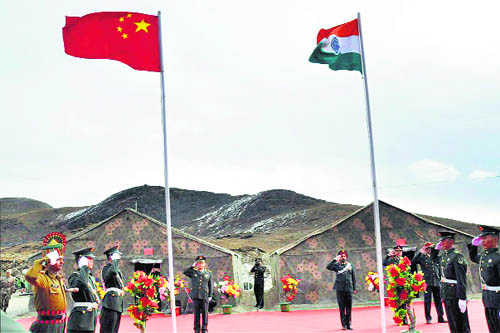
Pravin Sawhney, Editor, FORCE
This could well be India's opportunity to manage China. In an interesting gesture, China has offered to assuage India's sovereignty concern on the Belt and Road Initiative (BRI). China has also proposed to start a series of dialogues for an "early harvest" on the disputed border issue, provided India agrees to consider finding common ground between its Act East policy and other development strategies, and the BRI.
Both Chinese proposals have come from its Ambassador in India, Luo Zhaohui. "We can change the name of the China Pakistan Economic Corridor (CPEC). Create an alternate corridor through Jammu and Kashmir, Nathu la (pass) or Nepal to deal with India's concerns," he said at Jawaharlal Nehru University in New Delhi. Earlier, he wrote in this newspaper (November 16), making a connection between the BRI and Act East policy. In what may not be a coincidence, the Russian Ambassador in India, Nokolay Kudashev, said that China and India should talk on the BRI and set aside their differences in favour of economic cooperation.
The timing of the Chinese offer is opportune. In December, the foreign ministers' trilateral meeting between India, China and Russia is to be held in Delhi followed by the 20th round of border resolution talks between special representatives of India and China. The Chinese interlocutor, Yang Jeichi, has been elevated as member of the Politburo of the Communist Party of China.
India’s military anxiety
India should consider the Chinese offer since it could address India's two core concerns: military and strategic. Let's start with the military anxiety. Given the unbridgeable gap between the Indian and Chinese military power; the fact that the disputed border is neither agreed on maps nor ground; that the terrain favours China owing to better infrastructure and acclimatisation of troops; and above all, that the border has a military moniker called the Line of Actual Control (LAC), which can be shifted by military force by the powerful side, India is constantly worried about intrusions and transgressions by Chinese troops.
This is why, departing from protocol, PM Narendra Modi, during Xi Jinping's visit to India in September, 2014, publicly sought clarification on the LAC at the joint press conference. Unlike the present LAC, transgressions on an agreed LAC — a de facto border — would be an act of aggression tantamount to a declaration of war. Since China did not want to lose the advantage of exercising military coercion by sauntering across the LAC at will, it rejected Modi's proposal. This proposal, which is the best that India could get short of the border resolution (which is unlikely anytime soon), could be the "early harvest" hinted by Luo in exchange for India considering the BRI.
Strategic concerns
Moreover, India has two strategic concerns — the said and the unsaid. The said one is about the CPEC which passes through territory held by Pakistan, but is claimed by India. China has responded by saying that a mutually acceptable route could be formulated. The unsaid concern, which is the trickier, is this: India believes that joining the BRI would limit its strategic options necessary for its rise. The best option, India believes is to partner with the US, and other like-minded democracies and friendly nations, in ensuring that the present regional architecture does not get upended by the BRI.
India, therefore, has announced its Act East policy with connectivity, trade and security as its three pillars. Its other development strategies include Sagarmala, Spice Route and Mausam initiatives, the Asia-Africa sea corridor with Japan, and the Quadrilateral — India, the US, Japan and Australia — dialogue for strategic and maritime cooperation. Moreover, the US, by renaming the Asia-Pacific as the Indo-Pacific has sought maritime partnership with India from East Asia — with the pivot in ASEAN —across the Indian Ocean Region. The US has also proposed connectivity on land and sea to counter the BRI.
Important issues
While all this appears exciting, India should consider three issues:
1 Its national power (economic, military and technological) does not compare favourably with China; the Indian Navy warships lack long-legs, numbers and endurance. Not to forget its limited annual allocations and an unenviable shipbuilding industry.
2 The BRI is a strategic threat since it impedes India's rise by getting its neighbourhood and "extended neighbourhood" on board the BRI. Soon, this would translate into military threat for India (on land and seas) since the People's Liberation Army would develop defence ties with nations that have joined the BRI to protect its own people, assets, infrastructure and interests there.
3 The US administration, with its withdrawal from the Trans-Pacific Partnership and 'America First' policy, has handed over the economic leadership of the Asia-Pacific to China. This has resulted in a review of the regional balance-of-power by US' allies Japan, South Korea and Vietnam, who are gravitating towards China.
Since these nations are hedging their bets, does it make sense for India to position itself as China's rival, especially when China is a power which cannot be contained? India's interests would be better served by considering the Chinese double offer. Strategic hedging or as the foreign secretary, S Jaishankar, recently said, "rigidity of positions no longer holds" should be adopted soonest.



























